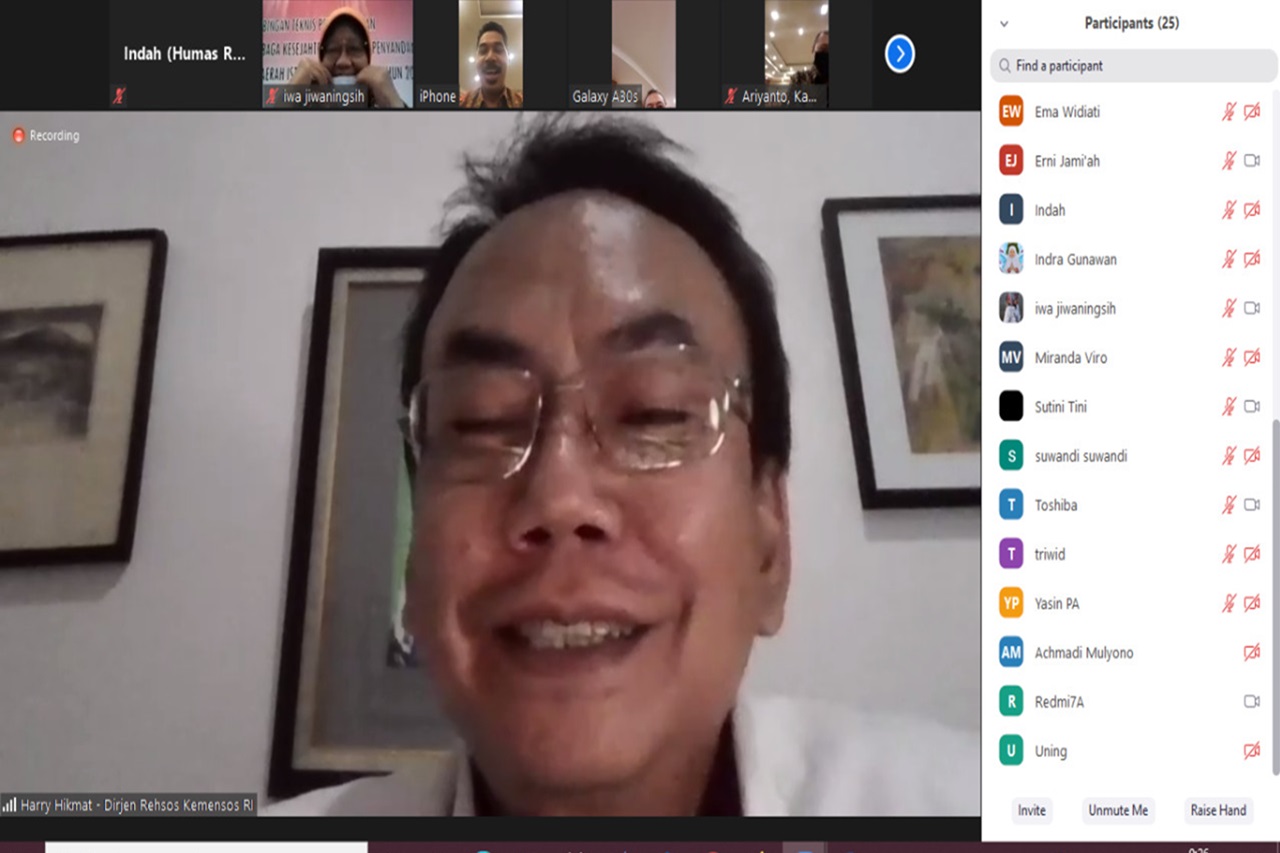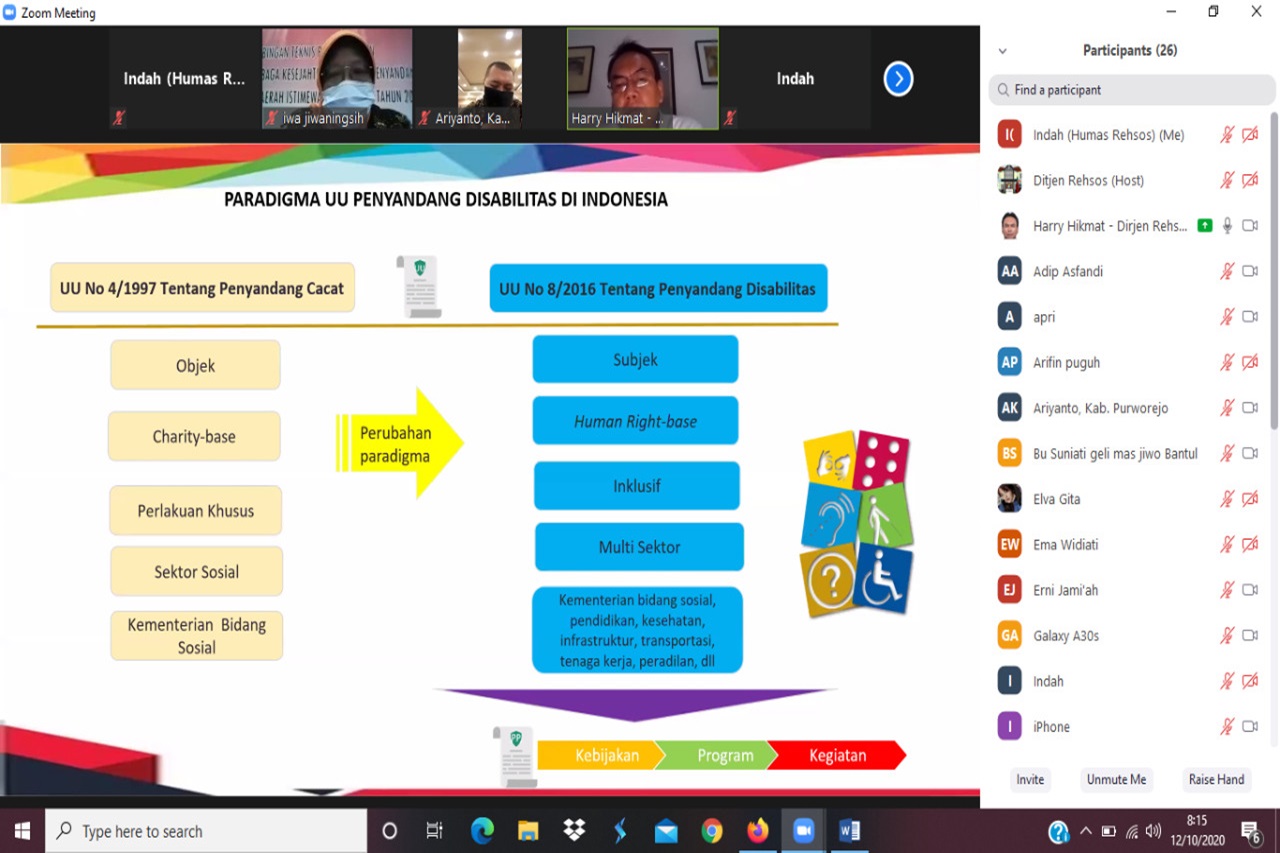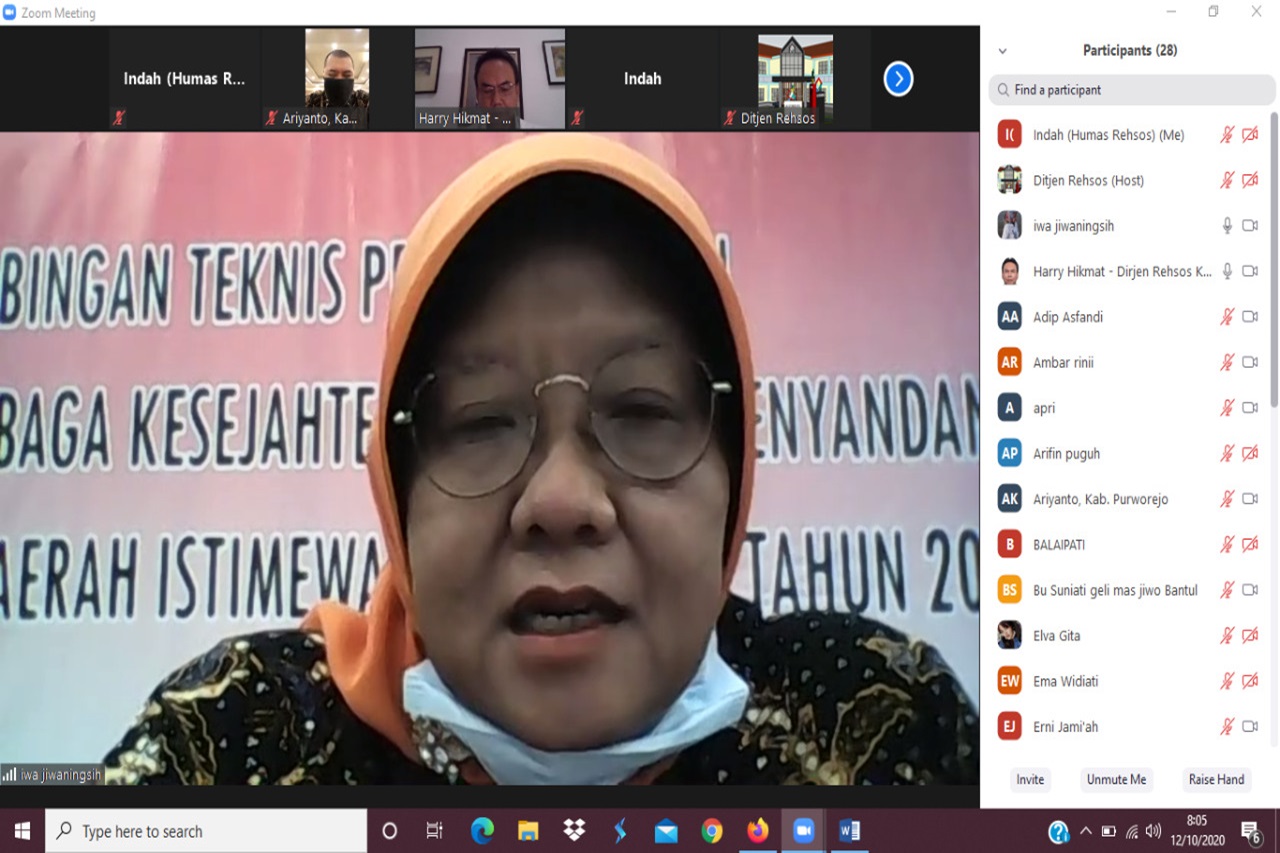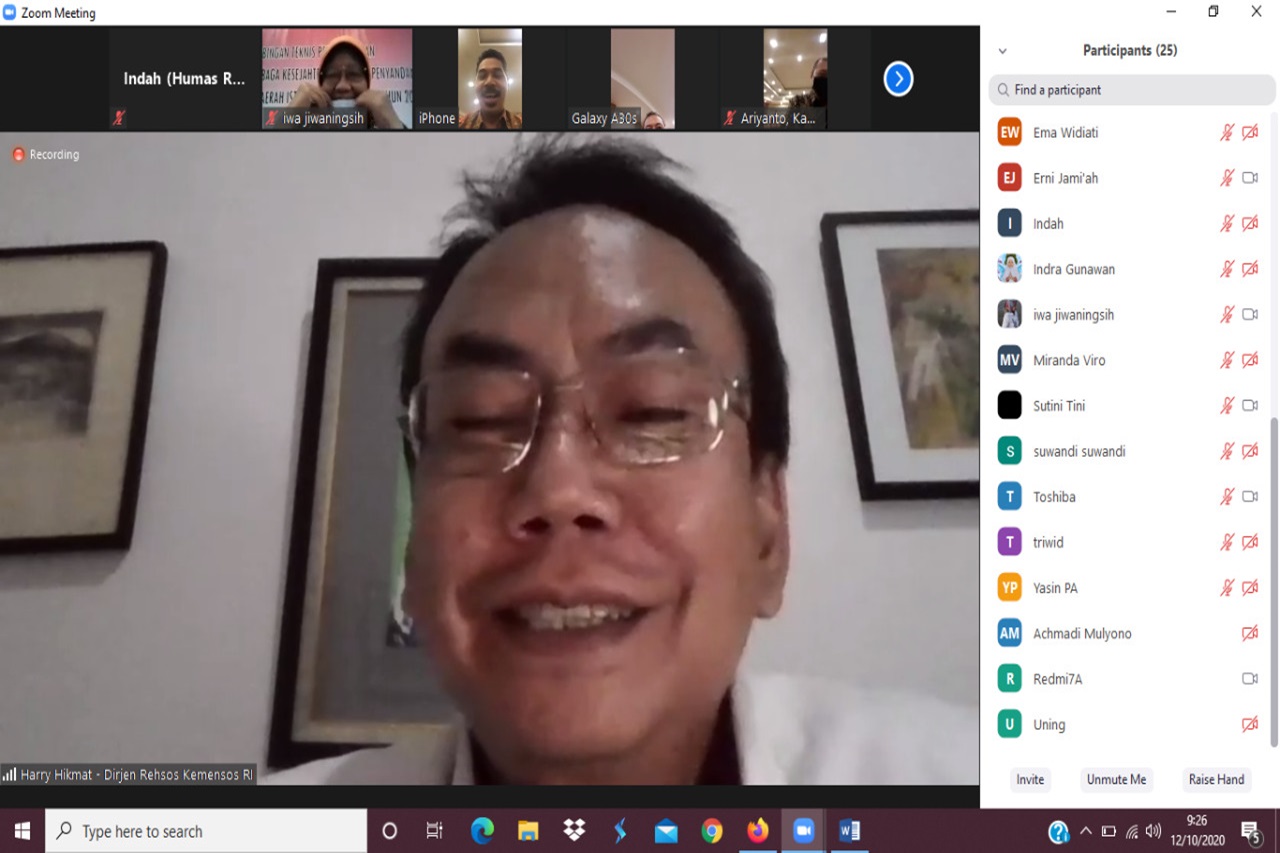Writer :
Humas Ditjen Rehsos
Editor :
Annisa YH
Translator :
Intan Qonita N
YOGYAKARTA (October 12, 2020) - The Indonesian Ministry of Social Affairs reiterates that the implementation of Law Number 8 of 2016 concerning Persons with Disabilities requires the role of various parties. This was conveyed by the Director General of Social Rehabilitation of the Indonesian Ministry of Social Affairs, Harry Hikmat in the Technical Guidance of Assistance to Social Welfare Agencies (LKS) for People with Mental Disabilities.
Several Government Regulations (PP) which are mandated by Law Number 8 of 2016 which regulate the protection and fulfillment of the rights of persons with disabilities have been made. One of them is the draft PP on Habilitation and Rehabilitation which is currently in the process of harmonization at the Ministry of Law and Human Rights.
Harry mandated that the process of habilitation and rehabilitation is the task of the Rehabilitation Center for Persons with Disabilities, one of which is "Margo Laras" Disability Center in Pati as the Technical Implementation Unit (UPT) of the Ministry of Social Affairs.
There are various types of people with mental disabilities, namely People with Mental Problems (ODMK) and People with Mental Disorders (ODGJ). ODMK are people who have physical, mental, social, growth, development and/or quality of life problems so that they are at risk of mental disorders.
ODMK who is not treated early will become ODGJ, that is, people experience disturbances of thought, behavior and feelings that are manifested in a set of symptoms and/or significant behavioral changes, which can cause obstacles in carrying out people's functions as humans.
From the dashboard of the Integrated Data Social Welfare (DTKS) for Social Welfare Service Recipients (PPKS) Persons with Disabilities built by the Data and Information Center (Pusdatin) of the Ministry of Social Affairs, there are various categories of disability and their combinations. As many as 85,048 people with mental disabilities have been recorded based on name by address (BNBA). "However, this data still has to be updated and re-verified," said Harry.
The Ministry of Social Affairs considers it important to reconstruct the handling of people with mental disabilities, so a social rehabilitation policy was born in the form of Social Rehabilitation Assistance (ATENSI) as respect, protection and fulfillment of the rights of persons with disabilities.
Through ATENSI, the strengthening of the social rehabilitation system that is integrated with social security, social empowerment and social protection will also be realized. ATENSI is also an effort to expand the reach of social rehabilitation through family, community and residential based approaches.
Things that need to be known by the parties involved in social rehabilitation that ODGJ can be caused by biological factors, namely genetic or hereditary aspects, neurotransmitter factors, namely problems that occur in a person's neurotransmitters or environmental factors, namely pressure from the family, work or social environment.
Several Government Regulations (PP) which are mandated by Law Number 8 of 2016 which regulate the protection and fulfillment of the rights of persons with disabilities have been made. One of them is the draft PP on Habilitation and Rehabilitation which is currently in the process of harmonization at the Ministry of Law and Human Rights.
Harry mandated that the process of habilitation and rehabilitation is the task of the Rehabilitation Center for Persons with Disabilities, one of which is "Margo Laras" Disability Center in Pati as the Technical Implementation Unit (UPT) of the Ministry of Social Affairs.
There are various types of people with mental disabilities, namely People with Mental Problems (ODMK) and People with Mental Disorders (ODGJ). ODMK are people who have physical, mental, social, growth, development and/or quality of life problems so that they are at risk of mental disorders.
ODMK who is not treated early will become ODGJ, that is, people experience disturbances of thought, behavior and feelings that are manifested in a set of symptoms and/or significant behavioral changes, which can cause obstacles in carrying out people's functions as humans.
From the dashboard of the Integrated Data Social Welfare (DTKS) for Social Welfare Service Recipients (PPKS) Persons with Disabilities built by the Data and Information Center (Pusdatin) of the Ministry of Social Affairs, there are various categories of disability and their combinations. As many as 85,048 people with mental disabilities have been recorded based on name by address (BNBA). "However, this data still has to be updated and re-verified," said Harry.
The Ministry of Social Affairs considers it important to reconstruct the handling of people with mental disabilities, so a social rehabilitation policy was born in the form of Social Rehabilitation Assistance (ATENSI) as respect, protection and fulfillment of the rights of persons with disabilities.
Through ATENSI, the strengthening of the social rehabilitation system that is integrated with social security, social empowerment and social protection will also be realized. ATENSI is also an effort to expand the reach of social rehabilitation through family, community and residential based approaches.
Things that need to be known by the parties involved in social rehabilitation that ODGJ can be caused by biological factors, namely genetic or hereditary aspects, neurotransmitter factors, namely problems that occur in a person's neurotransmitters or environmental factors, namely pressure from the family, work or social environment.
One of the issues with ODGJ is deprivation caused by the family being confused about how to handle it, unable to access the assistance and services needed. Some of the ways of deprivation were carried out using wood, chains, cages, locked in a room, being exiled in the middle of the forest and various other forms of physical restraint.
The government through the Ministry of Social Affairs has launched the 2019 Stop Stocks Movement in collaboration with the Ministry of Home Affairs, Ministry of Health, Police and BPJS. In 2019, there were also 9,601 Puskesmas spread across 34 provinces capable of handling ODGJ.
Therefore, Harry advised that the role of local governments and the support of human resources is also very necessary in handling ODGJ. "Handling for persons with disabilities must be dynamic and integrated with other centers, institutions and institutions. They must strengthen each other," he said.
The main components in ATENSI are meeting basic needs, social care/care, therapy and family support for people with disabilities. This can be done in the family, community and/or at the Center/House according to the results of a comprehensive assessment.
The Ministry of Social Affairs encourages the implementation of ATENSI in the family, because the family is the best place in the care of persons with disabilities. However, when the family cannot afford treatment, the existence of LKS becomes important in implementing community-based ATENSI, because LKS is the institution closest to the community.
Harry advised that "Margo Laras" Disability Center Pati would play a role in ensuring and providing assistance to institutions and families in providing occupational and vocational therapy. The Center will also become a Social Service Center (SERASI) capable of providing services to all types of disabilities ranging from early childhood to the elderly.
This activity was organized by the "Margo Laras" Disability Center Pati from 11 to 12 October 2020 at the Cavinton Hotel Yogyakarta. This activity was attended by 30 participants consisting of LKS Budi Makarti Boyolali Management, LKS Pandi Purworejo, LKS Tirto Jiwo Purworejo, LKS Gelimas Jiwo Yogyakarta, Boyolali Regency Social Office, P3A Social Office Purworejo Regency and Purworejo Regency Health Office.
The government through the Ministry of Social Affairs has launched the 2019 Stop Stocks Movement in collaboration with the Ministry of Home Affairs, Ministry of Health, Police and BPJS. In 2019, there were also 9,601 Puskesmas spread across 34 provinces capable of handling ODGJ.
Therefore, Harry advised that the role of local governments and the support of human resources is also very necessary in handling ODGJ. "Handling for persons with disabilities must be dynamic and integrated with other centers, institutions and institutions. They must strengthen each other," he said.
The main components in ATENSI are meeting basic needs, social care/care, therapy and family support for people with disabilities. This can be done in the family, community and/or at the Center/House according to the results of a comprehensive assessment.
The Ministry of Social Affairs encourages the implementation of ATENSI in the family, because the family is the best place in the care of persons with disabilities. However, when the family cannot afford treatment, the existence of LKS becomes important in implementing community-based ATENSI, because LKS is the institution closest to the community.
Harry advised that "Margo Laras" Disability Center Pati would play a role in ensuring and providing assistance to institutions and families in providing occupational and vocational therapy. The Center will also become a Social Service Center (SERASI) capable of providing services to all types of disabilities ranging from early childhood to the elderly.
This activity was organized by the "Margo Laras" Disability Center Pati from 11 to 12 October 2020 at the Cavinton Hotel Yogyakarta. This activity was attended by 30 participants consisting of LKS Budi Makarti Boyolali Management, LKS Pandi Purworejo, LKS Tirto Jiwo Purworejo, LKS Gelimas Jiwo Yogyakarta, Boyolali Regency Social Office, P3A Social Office Purworejo Regency and Purworejo Regency Health Office.
Share :
 English
English
 Bahasa
Bahasa




